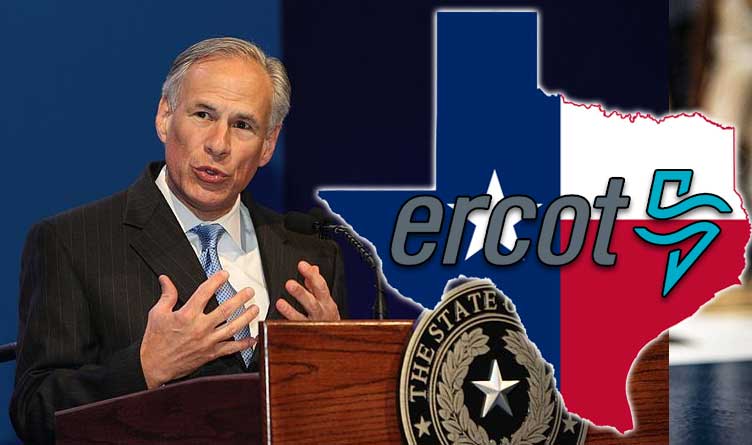Gov. Abbott Blamed Power Failures On The Electric Reliability Council Of Texas (ERCOT), The Non-Profit Corporation Tasked With Overseeing Energy Production For 26 Million Texans, While ERCOT Argues It Is Up To Legislators To Implement Minimal Weatherization Standards As ERCOT Has No Such Authority.

Published February 25, 2021
The Center Square [By Bethany Blankley] –
Gov. Greg Abbott delivered a televised address Wednesday night to discuss the state’s ongoing efforts to help millions of Texans impacted by widespread power outages during sub-freezing temperatures.
“Many of you are angry, and you have a right to be,” he said in his five-minute remarks. “I am angry too. At a time when essential services were needed the most, the system broke.”
Abbott said Texans would get answers, blaming the power failures on the Electric Reliability Council of Texas (ERCOT), the non-profit corporation tasked with overseeing energy production for 26 million Texans.
Abbott said prior to the storm, “ERCOT repeatedly assured the state and the public that ERCOT was prepared. Those assurances turned out to be false,” Abbott said.
“We now know that power generators of all sources were not prepared for this severe winter weather. We have also learned that ERCOT operators should have acted quicker to stabilize the grid and to prevent power generators from being knocked offline.”
Abbott said he is already working with lawmakers to implement reform, overhaul ERCOT, and investigate spikes customers are already seeing in their energy bills.
“ERCOT operators should have operated sooner to stabilize the grid,” he argued.
But at an emergency board meeting Wednesday, Bill Magness, president and CEO of ERCOT, said until the rolling blackouts it implemented, Texas was four minutes and 37 seconds away from a total grid failure. Power failures could have been catastrophic lasting for weeks or months, he said.
“Generation owners and operators are not required to implement any minimum weatherization standard or perform an exhaustive review of cold weather vulnerability,” Magness said. “No entity, including the PUC or ERCOT, has rules to enforce compliance with weatherization plans or enforce minimum weatherization standards.”
ERCOT has no authority to require power companies to implement any minimum weatherization standards, because no state law exists requiring them to do so.
Unlike power plants operating in either the East or West Coast grids, subject to federal and state guidelines, no state laws exist requiring weatherization standards for companies operating on the independent Texas grid. Instead, they operate on the “honor system.”
“While we request and review detailed plant records, the only entity that can confirm that a plant is ‘weatherized’ to any particular standard is the entity that owns or operates the plant,” Magness said.
It’s up to the state legislature to require minimum weatherization standards, which it has not done, ERCOT and some state legislators like state Sen. Bob Hall and Rep. Tony Tinderholt, have argued. Hall and Tinderholt have consistently introduced legislation and called for efforts to stabilize the grid, calling attention to the problem at Texas Electric Grid summits in 2016 and 2019.
Abbott and Republican leadership did not act on proposed legislation nor did they listen to their warnings, these and other legislators argue.
The Texas Legislature failed to ensure that power plants could operate in extreme weather conditions, officials from the Federal Energy Regulatory Commission and the North American Electric Reliability Corporation found in a revised report.
The same 26 power generators that failed during a 2011 winter storm had also failed during a 1989 storm, according to a review of the 2011 event published by FERC and the NAERC. Legislators were aware, yet no legislative action was taken.
Power companies in Texas “failed to adequately prepare for winter,” the FERC and NAERC report states, specifically citing inadequate insulation and a failure of companies to train operators and maintenance personnel on how to prepare for winter.
In 2011, the Public Utility Commission, which oversees ERCOT along with the legislature, did make some changes, amending its rules to authorize ERCOT to conduct generator site visits to review compliance with weatherization plans. Since then, ERCOT has performed roughly 80 spot checks a year at sites to review weatherization plans, and verify that plant personnel are following the plan and providing recommendations based on PUC requirements.
Magness is expected to testify before a Senate committee and joint House committee Thursday beginning at 9 a.m.





